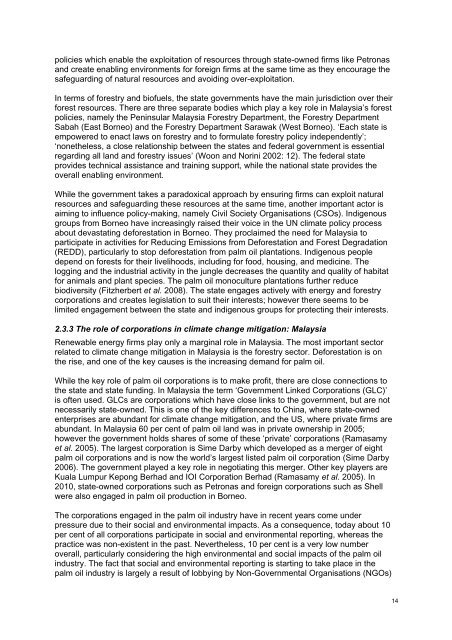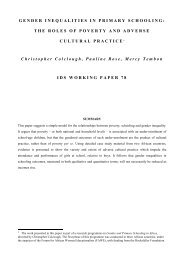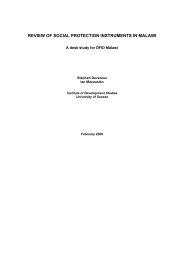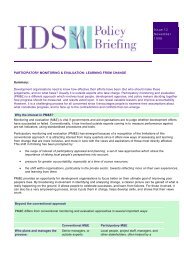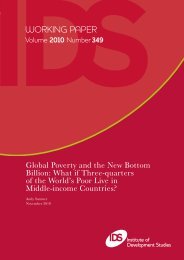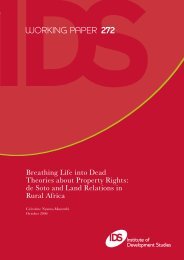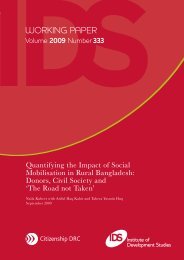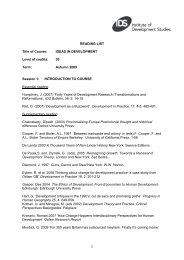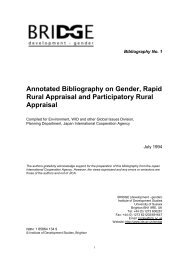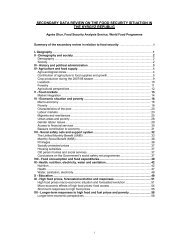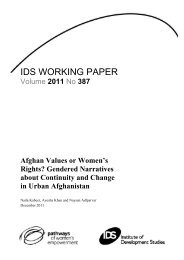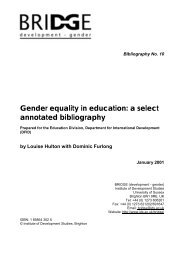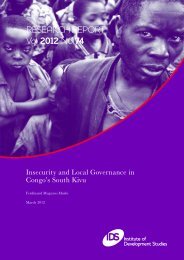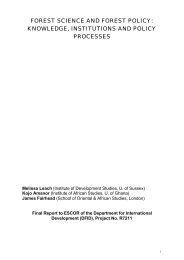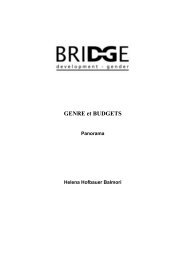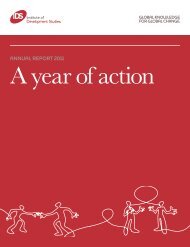IDS WORKING PAPER - Institute of Development Studies
IDS WORKING PAPER - Institute of Development Studies
IDS WORKING PAPER - Institute of Development Studies
You also want an ePaper? Increase the reach of your titles
YUMPU automatically turns print PDFs into web optimized ePapers that Google loves.
policies which enable the exploitation <strong>of</strong> resources through state-owned firms like Petronas<br />
and create enabling environments for foreign firms at the same time as they encourage the<br />
safeguarding <strong>of</strong> natural resources and avoiding over-exploitation.<br />
In terms <strong>of</strong> forestry and bi<strong>of</strong>uels, the state governments have the main jurisdiction over their<br />
forest resources. There are three separate bodies which play a key role in Malaysia’s forest<br />
policies, namely the Peninsular Malaysia Forestry Department, the Forestry Department<br />
Sabah (East Borneo) and the Forestry Department Sarawak (West Borneo). ‘Each state is<br />
empowered to enact laws on forestry and to formulate forestry policy independently’;<br />
‘nonetheless, a close relationship between the states and federal government is essential<br />
regarding all land and forestry issues’ (Woon and Norini 2002: 12). The federal state<br />
provides technical assistance and training support, while the national state provides the<br />
overall enabling environment.<br />
While the government takes a paradoxical approach by ensuring firms can exploit natural<br />
resources and safeguarding these resources at the same time, another important actor is<br />
aiming to influence policy-making, namely Civil Society Organisations (CSOs). Indigenous<br />
groups from Borneo have increasingly raised their voice in the UN climate policy process<br />
about devastating deforestation in Borneo. They proclaimed the need for Malaysia to<br />
participate in activities for Reducing Emissions from Deforestation and Forest Degradation<br />
(REDD), particularly to stop deforestation from palm oil plantations. Indigenous people<br />
depend on forests for their livelihoods, including for food, housing, and medicine. The<br />
logging and the industrial activity in the jungle decreases the quantity and quality <strong>of</strong> habitat<br />
for animals and plant species. The palm oil monoculture plantations further reduce<br />
biodiversity (Fitzherbert et al. 2008). The state engages actively with energy and forestry<br />
corporations and creates legislation to suit their interests; however there seems to be<br />
limited engagement between the state and indigenous groups for protecting their interests.<br />
2.3.3 The role <strong>of</strong> corporations in climate change mitigation: Malaysia<br />
Renewable energy firms play only a marginal role in Malaysia. The most important sector<br />
related to climate change mitigation in Malaysia is the forestry sector. Deforestation is on<br />
the rise, and one <strong>of</strong> the key causes is the increasing demand for palm oil.<br />
While the key role <strong>of</strong> palm oil corporations is to make pr<strong>of</strong>it, there are close connections to<br />
the state and state funding. In Malaysia the term ‘Government Linked Corporations (GLC)’<br />
is <strong>of</strong>ten used. GLCs are corporations which have close links to the government, but are not<br />
necessarily state-owned. This is one <strong>of</strong> the key differences to China, where state-owned<br />
enterprises are abundant for climate change mitigation, and the US, where private firms are<br />
abundant. In Malaysia 60 per cent <strong>of</strong> palm oil land was in private ownership in 2005;<br />
however the government holds shares <strong>of</strong> some <strong>of</strong> these ‘private’ corporations (Ramasamy<br />
et al. 2005). The largest corporation is Sime Darby which developed as a merger <strong>of</strong> eight<br />
palm oil corporations and is now the world’s largest listed palm oil corporation (Sime Darby<br />
2006). The government played a key role in negotiating this merger. Other key players are<br />
Kuala Lumpur Kepong Berhad and IOI Corporation Berhad (Ramasamy et al. 2005). In<br />
2010, state-owned corporations such as Petronas and foreign corporations such as Shell<br />
were also engaged in palm oil production in Borneo.<br />
The corporations engaged in the palm oil industry have in recent years come under<br />
pressure due to their social and environmental impacts. As a consequence, today about 10<br />
per cent <strong>of</strong> all corporations participate in social and environmental reporting, whereas the<br />
practice was non-existent in the past. Nevertheless, 10 per cent is a very low number<br />
overall, particularly considering the high environmental and social impacts <strong>of</strong> the palm oil<br />
industry. The fact that social and environmental reporting is starting to take place in the<br />
palm oil industry is largely a result <strong>of</strong> lobbying by Non-Governmental Organisations (NGOs)<br />
14


